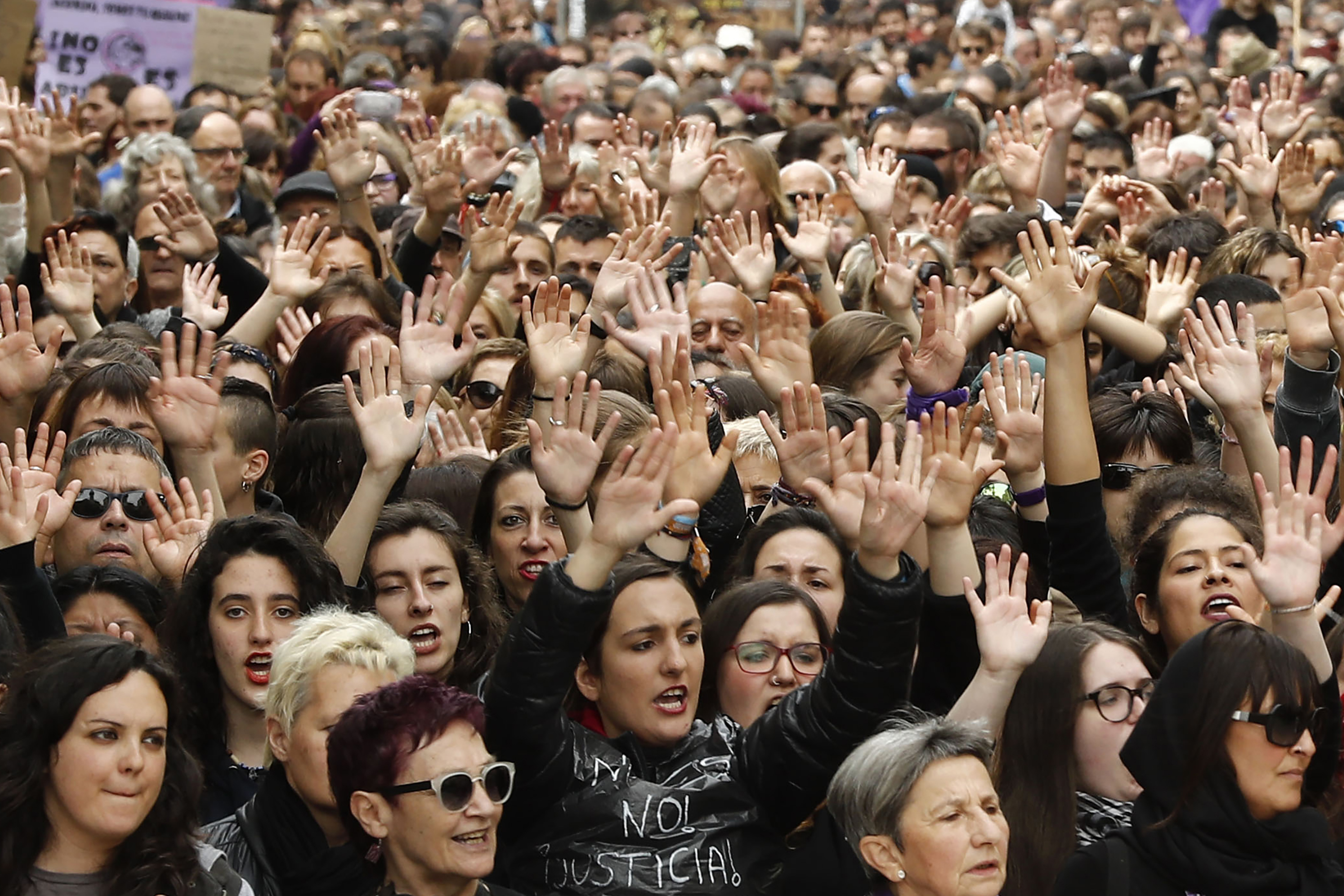Mass protests in Spain over bull-running gang rape acquittal
Spanish government considers changing sex crime laws amid national outcry

A free daily email with the biggest news stories of the day – and the best features from TheWeek.com
You are now subscribed
Your newsletter sign-up was successful
Tens of thousands of demonstrators marched in the Spanish city of Pamplona on Saturday in a third day of protests over the acquittal of five men of gang rape.
The men - who called themselves the Wolf Pack in their WhatsApp group - were cleared on Thursday of the rape of an 18-year-old woman during the city’s bull-running festival in 2016. All five were convicted of the lesser charge of sexual abuse, a verdict against which the victim is appealing.
Despite prosecutors asking for sentences of more than 20 years, the men - Jose Angel Prenda, Alfonso Cabezuelo, Antonio Manuel Guerrero, Jesus Escudero and Angel Boza - were each jailed for nine years.
The Week
Escape your echo chamber. Get the facts behind the news, plus analysis from multiple perspectives.

Sign up for The Week's Free Newsletters
From our morning news briefing to a weekly Good News Newsletter, get the best of The Week delivered directly to your inbox.
From our morning news briefing to a weekly Good News Newsletter, get the best of The Week delivered directly to your inbox.
Under Spanish law, evidence of violence or intimidation must exist for the offence of rape to be proved, The Guardian reports.
But as an editorial in top-selling Spanish newspaper El Pais points out, that legal nuance is was “not always easy to establish”. The existing laws raise “the painful question of just how much a person needs to fight to avoid being raped without risking getting killed, and still get recognised as a victim of a serious attack against sexual freedom while ensuring that the perpetrators do not enjoy impunity”, the newspaper says.
That sentiment has been echoed across Spain following last week’s trial verdict. Police say “between 32,000 and 35,000 people” took part in the demonstrations in Pamplona this weekend. Protests were also held in Barcelona, Valencia and Madrid, with marchers carrying banners that read “it’s not sexual abuse, it’s rape” and “no one judges our opinion”.
The Spanish hashtag #cuentalo, meaning “tell it”, has also been widely tweeted in recent days, as people “shared their own stories of abuse in solidarity” with the victim, says the BBC.
A free daily email with the biggest news stories of the day – and the best features from TheWeek.com
Meanwhile, an online petition calling for the disqualification of the judges who passed the sentence had been signed by more than 1.2 million people by Saturday, news website The Local reports.
In response to the unrest, Spain’s conservative government said it would consider changing laws relating to rape and sexual assault.
A number of high-profile figures are backing the calls for action. Ana Botin, the head of Santander, one of Spain’s biggest and most influential banks, tweeted that last week’s ruling was “a step back for women’s security”. Madrid mayor Manuela Carmena said it “does not meet women’s demand for justice” and called for the country’s supreme court to overturn the decision.
-
 How the FCC’s ‘equal time’ rule works
How the FCC’s ‘equal time’ rule worksIn the Spotlight The law is at the heart of the Colbert-CBS conflict
-
 What is the endgame in the DHS shutdown?
What is the endgame in the DHS shutdown?Today’s Big Question Democrats want to rein in ICE’s immigration crackdown
-
 ‘Poor time management isn’t just an inconvenience’
‘Poor time management isn’t just an inconvenience’Instant Opinion Opinion, comment and editorials of the day
-
 Epstein files topple law CEO, roil UK government
Epstein files topple law CEO, roil UK governmentSpeed Read Peter Mandelson, Britain’s former ambassador to the US, is caught up in the scandal
-
 Iran and US prepare to meet after skirmishes
Iran and US prepare to meet after skirmishesSpeed Read The incident comes amid heightened tensions in the Middle East
-
 Israel retrieves final hostage’s body from Gaza
Israel retrieves final hostage’s body from GazaSpeed Read The 24-year-old police officer was killed during the initial Hamas attack
-
 China’s Xi targets top general in growing purge
China’s Xi targets top general in growing purgeSpeed Read Zhang Youxia is being investigated over ‘grave violations’ of the law
-
 Panama and Canada are negotiating over a crucial copper mine
Panama and Canada are negotiating over a crucial copper mineIn the Spotlight Panama is set to make a final decision on the mine this summer
-
 Why Greenland’s natural resources are nearly impossible to mine
Why Greenland’s natural resources are nearly impossible to mineThe Explainer The country’s natural landscape makes the task extremely difficult
-
 Iran cuts internet as protests escalate
Iran cuts internet as protests escalateSpeed Reada Government buildings across the country have been set on fire
-
 US nabs ‘shadow’ tanker claimed by Russia
US nabs ‘shadow’ tanker claimed by RussiaSpeed Read The ship was one of two vessels seized by the US military